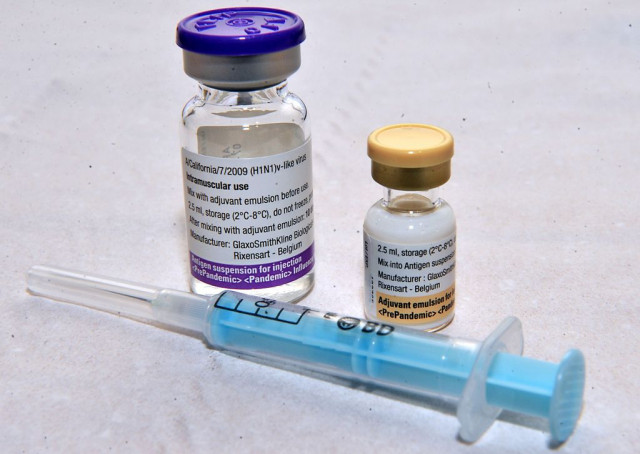Back from the dead: K-P without a plan as swine flu rears its head
NIH confirmed two cases in the province after a gap of three years.

NIH confirmed two cases in the province after a gap of three years. PHOTO: FILE
After the confirmation of two cases of swine flu in the province, the Khyber-Pakhtunkhwa (K-P) government is yet to plan a prevention strategy. Hospitals in K-P are also short on anti-viral drugs, which are being brought from other provinces.
Last week the National Institute of Health (NIH) confirmed two cases of the H1N1 virus, swine flu, in the province after an absence of three years. One patient succumbed to the disease whereas the other was discharged after receiving treatment from Khyber Teaching Hospital (KTH) .
A senior doctor at KTH, requesting anonymity, claimed the hospital had received various suspected cases of swine flu during the last month. The doctor confirmed two patients had tested positive and one died in the hospital.
Commenting on the lack of a specified protocol for the treatment of swine flu patients, the doctor said there were no isolation units for these patients; they had been admitted in another room.
Once new cases ceased to surface, he said the hospital purchased anti-viral drugs for its own staff through the World Health Organization (WHO). Due to a lack of available anti-viral drugs in the province, the hospital has been forced into procuring medicine from Quetta and Multan.
The WHO was also requested to establish isolation units at the hospital for effective and timely hospitalisation, however, the doctor lamented that to date no such initiative has come to fore.
Dr Mukhtiyar Zaman Afridi, a professor at the KTH, stated swine flu was a highly contagious, acute respiratory disease, which develops in pigs and spreads through aerosols produced when the animal coughs and sneezes, direct and indirect contact, and asymptomatic carrier pigs. However, thanks to a new strain of the virus, H1N1 spreads among people who have not been near pigs, according to WebMD’s website.
As preventive measures, the doctor said people should cover their mouths while coughing or sneezing, and avoid spitting in public spaces. He also advised quarantining patients suffering from the disease to prevent spread of the infection.
KTH Chief Executive Officer Prof Dr Inayat Shah Roghani admitted that they have bought anti-viral drugs from other provinces and requested the WHO to provide them. He said recently two suspected patients were admitted in KTH while tests revealed one patient as being positive and the other negative.
One of the patients had died while the other was discharged. After the cases appeared, the KTH separated beds of swine flu patients from other wards and has also prepared an isolation ward to cater to any new cases that might surface. Roghani said the hospital administration has once again requested WHO to provide vaccines for all staff of the hospital. The health department has also been requested for assistance.
Published in The Express Tribune, February 24th, 2014.













COMMENTS
Comments are moderated and generally will be posted if they are on-topic and not abusive.
For more information, please see our Comments FAQ